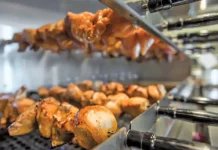
Article by Lance E. Rothenberg, Esq., LL.M (Taxation), Tenenbaum Law P.C.
Restaurateurs looking to buy a restaurant, or the business assets of a closing or for-sale restaurant, must take care not to inadvertently also purchase the former owner’s pre-existing sales tax liabilities along with the deep-fryer, reach-in cooler, and banquettes. This type of transaction, for sales tax purposes, is considered a “bulk sale,” and special rules apply.
Bulk sale purchasers can be personally liable for the seller’s unpaid sales and use tax debts. Accordingly, it’s crucial to understand and comply with the applicable bulk sale rules and requirements. Let’s take a brief look at New York’s bulk sale rules, and the consequences for failing to live up to them.
A. Definition of a Bulk Sale
While each state has its own rules, in New York, a bulk sale is the sale, transfer or assignment of business assets, in whole or in part, by a person required to collect sales tax.[1] This definition has a few parts.
First, the business involved must be a sales tax business. In New York, as in most states, the sale of a restaurant meal is subject to sales tax, so that’s a given here. Second, the bulk sale rules apply to nearly all asset “transfers.” That’s important. While we typically refer to “sales,” these rules cover more than just sales. Most transfers qualify, including assignments and gift transfers.
Third, the transfer must involve business assets. Business assets, in turn, are broadly defined as any assets directly related to the conduct of the business, including the building, fixtures, equipment, and even certain intangible assets (such as good will). The transfer must be outside the ordinary course of business. Restaurants ordinarily sell meals, so the sale of a meal, for example, is excluded. Restaurants, though, don’t ordinarily sell a chunk of their own equipment.
Here are three common examples of a bulk sale: A restaurant that is closing sells its fixtures and equipment to an individual opening a new restaurant; a restaurant owner decides to retire, and he sells his restaurant (including fixtures, equipment and inventory) to another restaurateur; an individual gives all of his business assets (the restaurant and its equipment) to another person as a gift.
B. Bulk Sale Requirements
Each state that has bulk sales rules has its own specific procedures, but generally bulk sale rules require the parties to an asset transfer to give notice of the pending transfer to the state taxing authority before taking possession or making payment to the seller. If timely notified by the parties, the state will then inform the parties of any potential claims for sales and use taxes owed by the seller. If taxes are due or if the state believes a claim exists, the purchaser will be required to withhold the purchase money in order, instead, to satisfy the seller’s pre-existing tax debt.
If the parties fail to properly notify the state and/or if the purchaser fails to properly withhold the purchase funds, then the purchaser may become jointly liable for the seller’s sales tax debts to the extent of the purchase price or the fair market value of the assets transferred to the purchaser.
Remember, the purpose behind these bulk sale procedures is to preserve the state’s right to collect outstanding sales tax debts, if any, from the seller by directly involving the purchaser in the tax collection process.
C. The Purchaser’s Obligations
Bulk sale rules are strict and require careful attention. In New York, most of the hard work falls on the purchaser (as opposed to the seller). Consequently, purchasers need to understand these rules. The purchaser is responsible for notifying the Tax Department of a pending bulk sale by filing specific paperwork (Form AU-196.10, Notification of Sale, Transfer, or Assignment in Bulk) at least 10 days before paying for or taking possession of any business assets, whichever happens first. The notification form should be sent to the Tax Department by U.S. certified mail, return receipt requested. The purchaser is responsible for proving the notice was property sent to the state. The 10-day deadline is strictly enforced.
Once notified, the Tax Department will respond to the purchaser in one of two ways. If the seller does not have any unpaid sales tax debts, then the Tax Department will issue a release (Form AU-197.1, Purchaser’s and/or Escrow Agent’s Release – Bulk Sale) to the purchaser. In this case, the purchaser may proceed with the purchase without fear of transferred liability.
On the other hand, if the seller owes, or is suspected of owing, unpaid sales taxes, the Tax Department will issue a notice of claim (Form AU-196.2, Notice of Claim to Purchaser) putting the purchaser on notice. This is important: a purchaser who receives a notice of claim should not pay the seller until the Tax Department completes an audit of the seller; usually within 90 days. Instead, the purchaser should place the full amount of the purchase price into an escrow account until the Tax Department notifies the parties of the amount of sales tax due, if any.
Once the Tax Department informs the parties of the seller’s unpaid tax debts, the purchaser can then pay the amount due directly to the Tax Department out of the escrow account, up to the purchase price or fair market value of the assets, whichever is greater. After paying the tax debt, if there is any remaining purchase money, it can then be paid to the seller. Following these rules will protect a purchaser. If a purchaser fails to follow these rules, however, she may very likely be held liable for the seller’s unpaid sales and use taxes debts related to the transferred business assets.
D. The Seller’s Obligations
In New York, a seller is obligated to give a bulk sale notification (Form TP-153, Notice to Prospective Purchasers of a Business or Business Assets) to a prospective purchaser, which outlines the purchaser’s responsibilities in a bulk sale. But remember, if the seller fails to provide this form, that does not relieve the purchaser of its obligations. Purchasers can’t avoid liability by claiming the seller never told them.
E. Additional Pointers
Bulk sale rules can get technical quickly. The time frames are strict and can be unforgiving. The forms are specific and required. Lastly, the rules vary by state.[2] The key, though, is to remember that if you don’t follow these rules in a bulk sale, then the seller’s debts can become your debts. That’s enough incentive to print this article and tuck it away in a file.
It is critical to remember, as noted above, that the bulk sale rules apply to most asset “transfers,” not just “sales.” Transfers between spouses or gifts from parent to child may well be treated as bulk sale transfers.[3] In these situations, the transferee can be burdened with the transferor’s debts up to the fair market value of the assets transferred.
Further, it is not uncommon for a purchaser to fill out the paperwork notifying the state of the pending transfer, learn from the state of the seller’s existing tax debt, but still proceed to closing and pay the purchase money to the seller and not the state. Maybe the seller assured you that he would handle his own debts? This is a recipe for trouble. These rules are more “prix fixe” than “a la carte.” Purchasers don’t get to pick and choose which rules to comply with.
There are at least two other, related issues worth mentioning. First, restaurateurs looking to buy or take-over a restaurant must also remember that they will need their own sales tax Certificate of Authority. The seller’s certificate is not transferrable to the purchaser. Accordingly, purchasers will need to register the new business in their own name with the Tax Department. Second, in New York, sales tax may also be due from the purchaser on the purchased assets. The purchaser can pay the sales tax to the seller or directly to the state. These and similar issues routinely cause problems in an audit or collection dispute.
Like most businesses, the restaurant industry is awash in thorny tax issues. Whether you are looking to break into the restaurant industry or simply expand your existing business, buying a restaurant, or its assets, may carry significant tax consequences. Knowing and following the bulk sales rules can mean the difference between financial success or ruin. If you are contemplating a bulk sale, or if you are facing a tax audit or dispute, you can email me at lrothenberg@litaxattorney.com.
 Lance E. Rothenberg is a tax attorney and is Of Counsel with Tenenbaum Law P.C., which is based in Melville, N.Y. Lance focuses on state and federal tax controversies and disputes, and has experience assisting a wide range of businesses and business owners facing federal, state, local, and multistate tax issues, including sales-and-use taxes, corporate income taxes, personal income taxes and excise taxes. You can reach him at lrothenberg@litaxattorney.com and at (631) 465-5000.
Lance E. Rothenberg is a tax attorney and is Of Counsel with Tenenbaum Law P.C., which is based in Melville, N.Y. Lance focuses on state and federal tax controversies and disputes, and has experience assisting a wide range of businesses and business owners facing federal, state, local, and multistate tax issues, including sales-and-use taxes, corporate income taxes, personal income taxes and excise taxes. You can reach him at lrothenberg@litaxattorney.com and at (631) 465-5000.
[1] See New York Tax Bulletin, “Bulk Sales,” TB-ST-70 (2013).
[2] Indeed, not every state even has these types of rules.
[3] See, e.g., In re GB&K/DCS LLC, DTA No. 825180 (N.Y. Div. Tax App., ALJ Unit) (06/04/2015) (liability imposed on transfer of business between husband and wife); In re Werner Boys, Inc., DTA No. 825530 (N.Y. Div. Tax App., ALJ Unit) (02/19/2015) (liability imposed on transfer of business between father and son).























